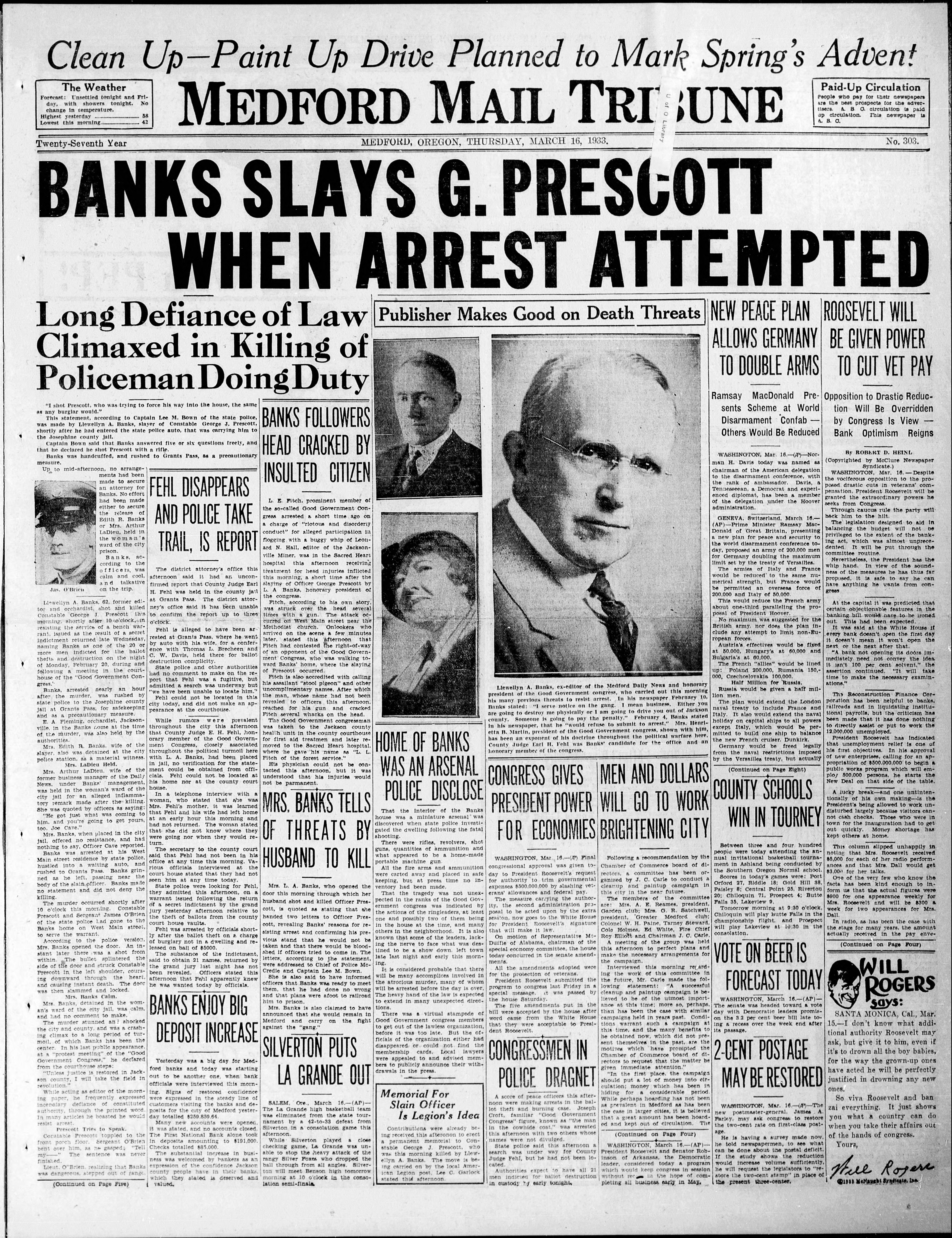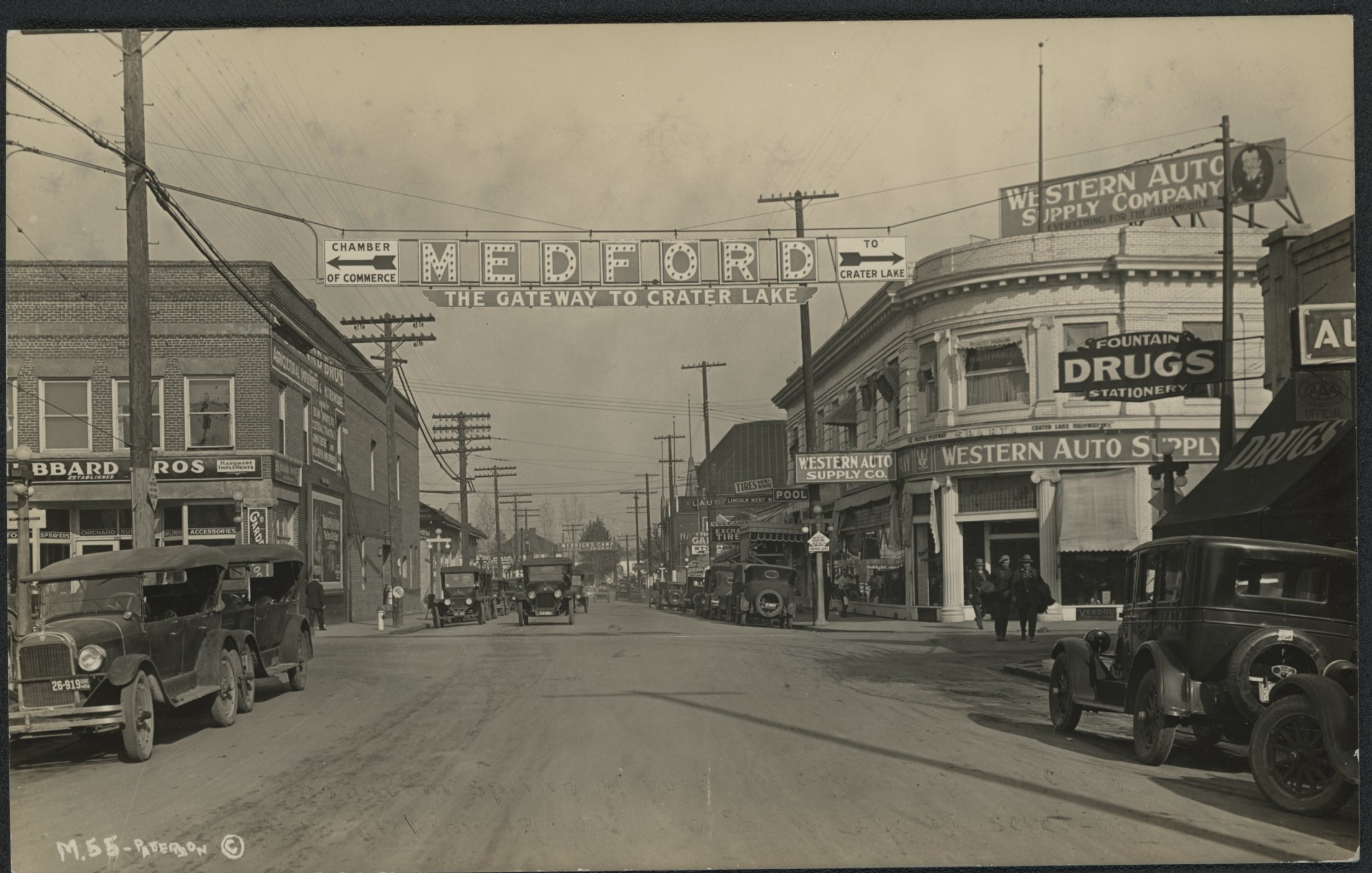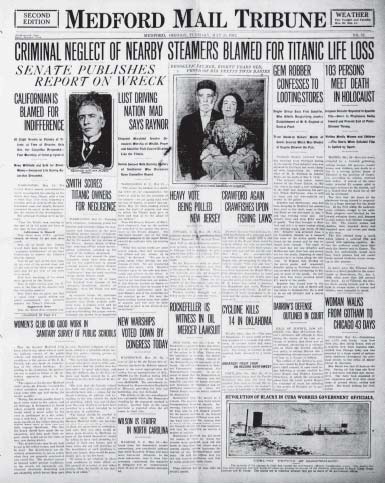During the severe economic stress of the early 1930s, a homegrown, radical, "populist" political movement that called itself the Good Government Congress briefly took over the reins of Jackson County's government. The GGC, which proved strongest in rural areas and among Medford’s working-class residents, was founded, promoted, and led by Llewellyn A. Banks, a demagogic Medford newspaper publisher and orchardist, and Earl Fehl, a perennially unsuccessful political candidate. After months of agitation and the climactic electoral takeover of the county courthouse, the movement, which gained national notoriety (and a Pulitzer Prize to the Medford Mail Tribune for opposing it), ended spectacularly in ballot fraud, theft, street violence, and murder.
Llewellyn Banks's stridently written daily column, “Once in a While,” enflamed the readers of his Daily News throughout 1931 and 1932. Couching his rhetoric in the patriotic language of the American Revolution, he relentlessly blamed the region's economic troubles on a variety of villains, ranging from the Federal Reserve Bank to a local "corrupt Courthouse Gang." Following the Bonus Army debacle in Washington, D.C., Banks advocated a man-on-horseback, "khaki-shirt" fascistic movement to end the nation’s problems.
Earl Fehl joined Banks in denouncing the alleged criminality of what they called the Gang—the county's political and legal establishment—and became the GGC's candidate for county judge in 1932. Fehl, along with the GGC candidate for sheriff, received winning margins, causing something of an earthquake in county politics and heightened concern by state political figures.
As GGC members gathered on the courthouse lawn to cheer speeches by their leaders—with Banks and Fehl guarded by a cadre of young toughs called the Green Springs Mountain Boys—complaints of irregularities in the ballot count from rural areas led to a state-ordered recount. On February 21, 1933, the day of the recount, state officials found that ballot pouches had been stolen from the courthouse vault the previous night. Some had been burned in the courthouse furnace, and others were weighted and tossed off a bridge into the Rogue River. Banks, Fehl, the new sheriff, and many other GGC figures were indicted for the theft and for conspiracy to commit criminal syndicalism.
When officers of the Oregon State Police arrived at Banks's Medford home to arrest him, he fatally shot a constable who tried to serve the warrant. Hundreds of GGC members rushed to disassociate themselves from Banks, and the movement essentially ended.
The GGC trials lasted well into 1933. Fehl was sent to the state penitentiary for the theft, and Banks received a life sentence for murder. While in prison, Banks wrote and had published a self-justifying memoir, Weighed in the Balance, in which he expressed the peculiar strain of antisemitism known as British Israelitism.
Some local opponents originally called the Good Government Congress a Bolshevik movement, although in 1941 the same people tarred Banks as a would-be Hitler. Despite Banks's own beliefs and intentions, however, the GGC episode—known as the Jackson County Rebellion—was actually far more of a traditional American back-country rebellion. It erupted when rural residents were living under very difficult circumstances and occurred at the same time a mob of hard-pressed Iowa farmers took captive a local judge and threatened to lynch him for his role in farm foreclosures. It was also a time when many Americans believed the country needed a populist-supported dictatorship to bring the country out of the Great Depression.
-
![]()
Medford Mail Tribune, March 16, 1933.
Courtesy University of Oregon Libraries.
-
![]()
Medford Mail Tribune, February 26, 1933.
Courtesy University of Oregon Libraries.
-
![]()
Medford Mail Tribune, February 22, 1933.
Courtesy University of Oregon Libraries.
Related Entries
-
![Bonus Army]()
Bonus Army
In 1932, with the Northwest lumber industry hit especially hard by the …
-
![Medford]()
Medford
Medford, the county seat of Jackson County, was platted in 1883 in the …
-
![Medford Mail Tribune]()
Medford Mail Tribune
For over a hundred years, the Medford Mail Tribune argued against what …
Map This on the Oregon History WayFinder
The Oregon History Wayfinder is an interactive map that identifies significant places, people, and events in Oregon history.
Further Reading
Battistella, Ed. Welcome to Literary Ashland Blog. "An Interview with Jeffrey Max LaLande, Author of the Jackson County Rebellion." March 15, 2023.
LaLande, Jeff. "The 'Jackson County Rebellion': Social Turmoil and Political Insurgence in Southern Oregon during the Great Depression." Oregon Historical Quarterly 95:4 (Winter 1994-95), 404-471.
LaLande, Jeffrey Max. The Jackson County Rebellion.: A Populist Uprising in Depression-Era Oregon. Corvallis: Oregon State University Press, 2023.






